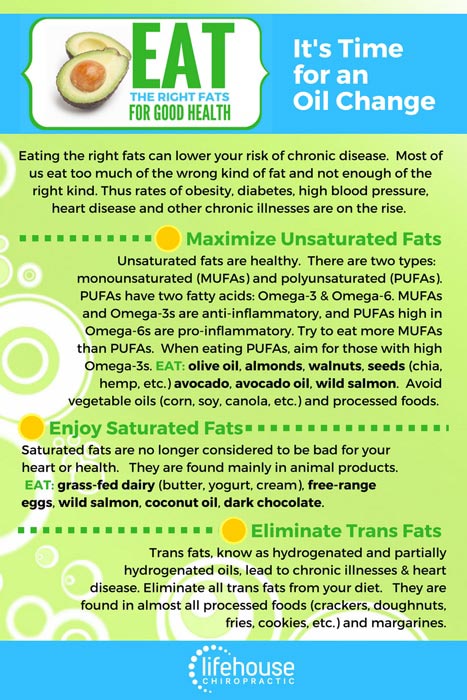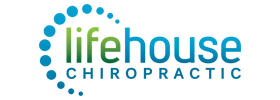The Fats of Life by Dr. Janna House, Chiropractor

Eating the right kind of fat can lower your risk of chronic disease in London. As I watch what people put into their shopping carts and into their mouths, here, in London, ON, I see that most Canadians eat too much of the wrong kind of fat and not enough of the right kind. Obesity, high blood pressure, heart disease, depression, focus and concentration problems, aches and pains of all sorts, and other chronic illnesses are on the rise.[ 1] I think it’s time for an oil change. The good thing is changing the types of fats and oils you eat is one of the easiest healthy swaps to make.
We Need Fats…
Fats are very important part of a health-promoting diet, and they make food taste delicious. In 2015, the U.S. Dietary Guidelines Advisory Committee released a radical recommendation to change its recommended dietary fat intake to include no upper limit on the three healthy types of fats. The recommendations took it a step further to say that it does not recommend low-fat diets or low-fat lifestyles for obesity prevention. [2]
Types of Fats…
There are basically four types of fat commonly found in our diet, saturated, monounsaturated, polyunsaturated, and trans. Most fats are a combination of all these types of fats. Essential fatty acids are those fats that the body cannot make on its own, and therefore, they must be acquired from the foods we eat.
Some Fats are Downright Harmful…Bad Fats
Everyone is familiar with the negative effects of trans fats or partially hydrogenated fats. While the U.S. is phasing out all artificial trans fats from foods, their use continues to be permitted in Canada. [3] Trans-fat is naturally occurring in some foods, like meat, but artificial trans fats are often found in partially hydrogenated oils, which are oils that are have been turned into solids with the addition of hydrogen.
Trans fats are commonly found in processed foods because they extend the shelf life of oils used for deep frying, they keep baked goods and frosting from drying out, and they add a creamy texture to coffee creamers and margarines. Avoid trans fats in processed foods and margarines; eating these will only promote inflammation and chronic disease.
Vegetable Oils are found in nearly every packaged food and salad dressing. They include soybean oil, corn oil, cottonseed oil, canola oil and others labeled as vegetable oil.
Vegetables are healthy, so one might assume that vegetable oil is healthy, too. Sadly, their oils become unhealthy when then are unnaturally extracted, they have an unhealthy balance of Omega-6 to Omega-3 ratio, and they become rancid or decompose easily when exposed to air, heat and light, causing them to oxidize and form free radicals.
This chemical breakdown destroys the nutrients your body needs and creates a compound that is actually hazardous to your health. [4, 5]
Canola oil needs special mention. According to the Canola Council, up to 80 percent of the canola grown in Canada has been genetically modified to make it resistant to pesticides. It is heavily sprayed with pesticides, and it is highly processed with harsh chemicals. [6] For these reasons, alone, Canola falls into the ‘bad fats’ category.
Some Fats are good for you…Smart Fats
Saturated fats (SFAs) are fats that are highly stable, they do not normally go rancid, even when heated during cooking. They are usually solid or semisolid at room temperature. Our bodies make saturated fatty acids from carbohydrates, and they are found in animal fats and tropical oils. The most recent research suggests that they are beneficial to our health. [7]
Examples of healthy saturated fats include organic, grass-fed cream and butter, grass-fed beef and palm oil.
Extra Virgin Coconut oil is a saturated fat and has been shown to have the following health benefits: boosts metabolism, is a good fuel source, has anti-microbial properties and helps fight infections, appears to be beneficial for cognitive function and appears to be good for your cardiovascular health. [8]
Monounsaturated fats (MUFAs) are fats that are liquid at room temperature and solidify when refrigerated. [9]
MUFAs are found in foods like olive oil, almonds, cashews, chia seeds, ground flaxseeds, hemp seeds, natto (fermented soy), dark chocolate, eggs, red meat and avocados.
The benefits of MUFAs are that they, keep your heart healthy [10], protect against metabolic syndrome [10], improve insulin dysfunction [11], help in weight management, improve mood [12], help strengthen bones [13], help brain cells communicate, which may boost cognition, learning and memory [14], may reduce risk of some cancers [15, 16, 17] and have anti-inflammatory properties [18]. Since inflammation is at the root of most diseases, including MUFAs as part of your diet will contribute to improved overall health.
Polyunsaturated fats (PUFAs) are fats that are typically liquid at room temperature but start to turn solid when chilled. Like MUFAs, PUFAs can have a beneficial effect on your heart when eaten in moderation. PUFAs contain two separate types of fatty acids: omega-3s and omega-6s, which should be combined in equal amounts. Consuming too much omega-6 and not enough omega-3 is associated with its own list of problems including increased cancer risk and heart disease, immune system dysfunction, damage to the liver, reproductive organs and lungs, digestive disorders, depressed learning ability, impaired growth and weight gain [19,20].
One reason the polyunsaturates can cause so many health issues, is that they tend to become oxidized or rancid when exposed to heat, oxygen or moisture. Rancid oils carry free radicals that are extremely reactive on a chemical level, and may attack cell membranes and red blood cells and cause damage in DNA/RNA strands, thus triggering mutations in tissue, blood vessels and skin. Free radical damage to the skin causes wrinkles and premature aging; free radical damage to the tissues and organs sets the stage for tumors; free radical damage in the blood vessels initiates the buildup of plaque. New evidence links exposure to free radicals with premature aging, with autoimmune diseases such as arthritis and with Parkinson’s disease, Lou Gehrig’s disease, Alzheimer’s and cataracts.
Modern agricultural and industrial practices have reduced the amount of omega-3 fatty acids in commercially available vegetables, eggs, fish and meat. For example, organic eggs from hens allowed to feed on insects and green plants can contain omega-6 and omega-3 fatty acids in the beneficial ratio of approximately one-to-one; but commercial supermarket eggs can contain as much as nineteen times more omega-6 than omega-3!
The key to eating polyunsaturated fats, is too eat them while attempting to eat enough oils/fats with Omega-3s and not too much of the Omega-6s. [20]
b
So what are your best cooking choices?
I recommend cutting out all refined oils except extra-virgin olive oil. (Avoid vegetable oils, canola oil, margarine, trans fats in processed foods.)
When cooking, I recommend using extra-virgin coconut oil or grass-fed butter for most baking and medium-high heat sautéing, avocado oil (which can be used at higher temperatures because these are highly stable oils), and ghee (clarified butter). Ghee has a higher smoking point at 400˚ to 500˚F and provides the same nutrients in grass-fed butter like cancer-fighting conjugated linoleic acid (CLA). Ghee and butter are also high in vitamins D and A, omega-3 fats, and butyric acid, which can boost immunity and help inflammation, as well as protect against colon cancer.
For low-heat cooking or using raw, as in salad dressings, olive oil is best, while avocado oil, macadamia oil, and walnut oil are also wonderful.
Whatever oil/fat you choose, always go for organic, unrefined, cold-pressed or expeller pressed oils.
Storage and shelf life are important to consider when using oils. Store oils in dark bottles and keep in a cool, dark place away from light and heat. Don’t store oils on kitchen counters or next to the stove. Always close the lid tightly and immediately store oils after using them because oxygen contributes to rancidity. Because oils can go bad in a matter of months, I suggest purchasing only the amount you will actually use within two months [21].
What are your best options for getting the healthy fats you need?
I recommend extra virgin olive oil, olives, extra virgin coconut oil, coconut products, avocado oil, avocadoes, grass-fed butter and dairy products, grass-fed beef, organic fowl, wild salmon, raw nuts (cashews, almonds, macadamia, walnuts) and seeds (chia, hemp, ground flax), and free-range organic eggs.
Our choice of fats is important. Most people need more, not less fat in their diets, especially infants, children and seniors. The fats we eat must be chosen with care to optimize health. In general, swap out cheap vegetable oils for smart fats. You’ll look better, feel better and reduce the risk of chronic disease.
Remember, subluxations can interfere with the brains ability to regulate digestion and absorption of nutrients; therefore, continue with regular chiropractic care to enhance absorption of the nutrients you ingest.
References…
https://health.clevelandclinic.org/2016/04/the-right-fats-can-make-you-lean/
https://health.gov/dietaryguidelines/2015-scientific-report/pdfs/scientific-report-of-the-2015-dietary-guidelines-advisory-committee.pdf
http://www.ctvnews.ca/health/as-u-s-cuts-trans-fats-still-no-ban-in-canada-1.2426524
https://www.ncbi.nlm.nih.gov/pmc/articles/PMC2166702/
http://bmcmedicine.biomedcentral.com/articles/10.1186/1741-7015-10-50
http://wellnessmama.com/35804/canola-oil-healthy/
https://drhyman.com/blogs/content/saturated-fat-get-bad-rep/
https://drhyman.com/blogs/content/separating-fat-from-fiction-10-fat-facts-you-need-to-know/http://www.health.harvard.edu/staying-healthy/the-truth-about-fats-bad-and-good
https://www.ncbi.nlm.nih.gov/pubmed/21308420
https://www.ncbi.nlm.nih.gov/pubmed/18301083
https://www.ncbi.nlm.nih.gov/pubmed/21298116
https://www.ncbi.nlm.nih.gov/pubmed/27262536
https://draxe.com/monounsaturated-fat/
https://www.ncbi.nlm.nih.gov/pubmed/27399120
https://www.ncbi.nlm.nih.gov/pubmed/26081477
https://www.ncbi.nlm.nih.gov/pubmed/26081477
https://www.ncbi.nlm.nih.gov/pubmed/22623392
https://draxe.com/the-truth-about-saturated-fat/
http://articles.mercola.com/sites/articles/archive/2002/08/21/saturated-fat2.aspx
https://authoritynutrition.com/healthy-cooking-oils/
CONVENIENT
OFFICE HOURS
Give us a call and let's find out how we can make your time in our office as convenient for you as possible.
Monday
7:30am - 11:00am
3:00pm - 6:00pm
Tuesday
3:00pm - 6:00pm
Wednesday
7:30am - 11:00am
3:00pm - 6:00pm
Thursday
3:00pm - 6:00pm
Friday
7:30am - 11:00am
Saturday
Closed
LifeHouse Chiropractic
520 Springbank Drive #4
London, ON N6J 1G8
Phone (519) 204-9460
Fax (519) 601-9461




